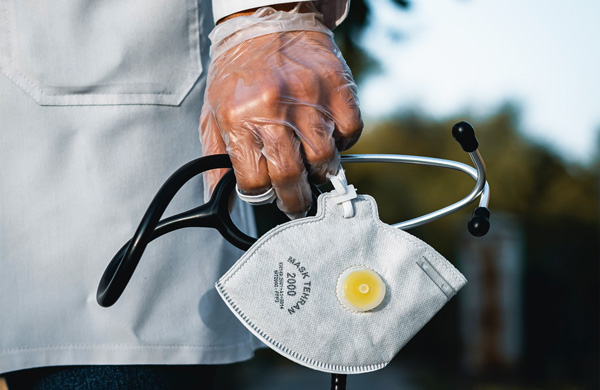By Barbara DiPietro, Senior Director of Policy
On Monday, April 22, the Supreme Court heard the case of Johnson v. Grants Pass — a case that determines whether it is cruel and unusual punishment for communities to ticket or fine unsheltered people for sleeping outside. For background, last month’s Closer Look blog described the key provisions of this case and outlined how to draw attention and build power around key advocacy messages.
Many organizations submitted amicus briefs (or “friends of the court” arguments) that outlined their perspectives on this issue. The Health Care for the Homeless Community participated in creating the public health amicus brief, which argued that sleep is a biological necessity, that unhoused people have no control over the factors that impact quality sleep, and that poor sleep inflicts profound negative consequences to the health of people experiencing homelessness.
While the Justices were inside hearing the case, hundreds of advocates rallied outside to protest the ongoing arrests, fines, and other measures levied against people with nowhere else to go. An impressive array of national and local leaders from across the country — including Council CEO Bobby Watts — spoke passionately about the importance of providing housing and supportive services, not enacting more punishments. (A big shout-out to the National Homelessness Law Center for organizing the advocacy around this case!)
It’s difficult to know how the Court will rule after they deliberated for more than two hours (transcript and audio recording here). Some of the questions the Justices posed during the hearing give clues to their thinking:
- You don’t arrest babies who have blankets over them, and you don’t arrest people who are sleeping on the beach—it’s only homeless people who sleep outdoors will be arrested, correct? (Sotomayor)
- If a homeless person had $250 [amount of the fine], don’t you think they’d stay in a hotel? (Kagan)
- Breathing is a human need and you can’t say it’s a crime to breathe, correct? (Kagan)
- Suppose the City decided that it was going to execute homeless people — that would be both cruel and unusual, wouldn’t it? (Jackson and Gorsuch) [Hint: the answer is YES.]
- Where do we put them [unsheltered people] if every city, every village, every town lacks compassion and passes a law identical to this? Where are they supposed to sleep? Are they supposed to kill themselves, not sleeping? (Sotomayor)
- What’s so complicated about letting someone somewhere sleep with a blanket outside if they have nowhere to sleep? (Sotomayor)
- What about someone who has a mental health problem that prohibits them from sleeping in a shelter? Are they allowed to sleep outside or not? (Gorsuch)
- Eating is a basic human function as well, that people have to do, just like sleeping. So if someone is hungry and no one is giving him food, can you prosecute him if he breaks into a store to get something to eat? (Roberts)
- What if the person is in a homeless state because of prior life choices or their refusal to make future life choices? (Alito)
- Would a backpacker who happens to be in the area for a few days be allowed to camp on public property? (Thomas)
Much of the discussion focused on legal arguments, prior cases, and definitions of terms like “homeless.” Many of the justices posed hypothetical situations for attorneys to respond to, and wrestled with how — or whether — the federal courts should be deciding these issues.
The Court will post a decision on or before June 30, the last day of its current term. Follow the Council on social media to stay up to date on the case!
Three Actions to Take Now
- Schedule a site visit with your elected officials: Take advantage of the attention on this issue to invite your elected officials for a site visit. Your Congressional representatives will be home in August — get on the calendar so you can discuss the vital importance of legislators dedicating more funding for housing! Also engage your local policymakers, who are often promoting these laws, so they can get a more informed understanding of an effective response.
- Write an op-ed: Use your local media outlets to educate your community about the intersection between homelessness and health, and build empathy and support for constructive solutions to homelessness (not arrests and fines). Use this toolkit to help!
- Storytelling: Engage people with lived expertise to record short videos of their story. Help connect the general public to the reality of homelessness so they better understand the challenges of living unsheltered. Have a variety of stories so that folks understand that there’s many paths to homelessness. Use the Storytelling Guide from our National Consumer Advisory Board (NCAB) to ensure consumers tell their story in an effective, trauma-informed way.
For further reading (no-paywall links):
- NPR | Supreme Court appears to side with an Oregon city’s crackdown on homelessness
- Reuters | US Supreme Court scrutinizes anti-camping laws used against the homeless
- NBC News | How a small city in Oregon could shape the way major U.S. cities handle homelessness
- Mother Jones | Will the Supreme Court Make Homelessness a Crime?
- Slate | A Supreme Court Case About the Rights of Homeless People Went Better Than Expected
- Documentary from Invisible People | Illegal to Sleep: Grants Pass’ Cruel War on Homelessness



